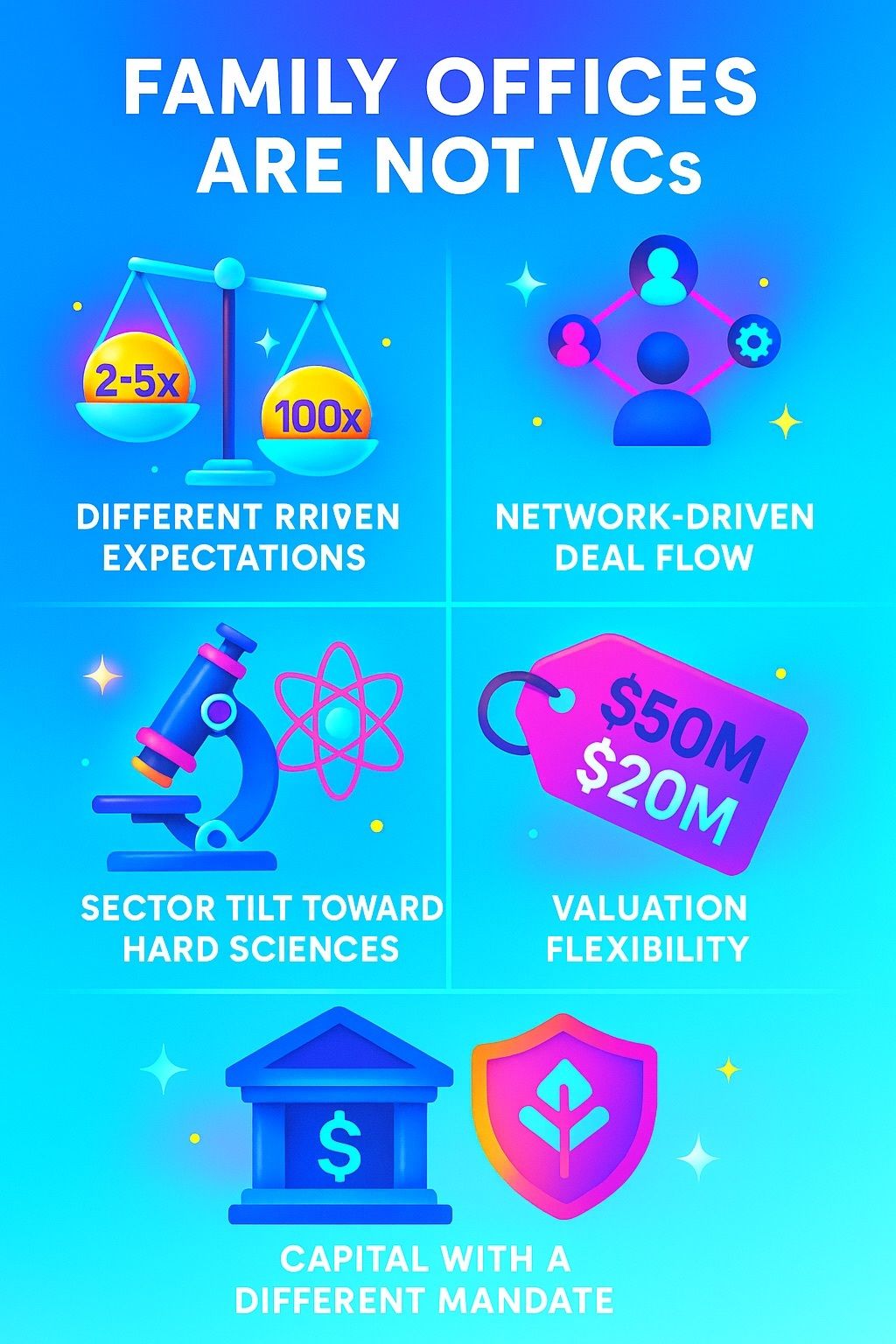
Last week I attended numerous Family Offices events and met some really amazing people. Obviously we started to talk about tech startups VC and it was fascinating the range of understanding, interest and perspective each one had based on their backgrounds and experience.
Over time I’ve learned that family offices and venture capital firms operate in fundamentally different ecosystems. Both may write checks into startups and both want exposure to innovation, but the way they source deals, evaluate risk, and expect returns could not be more different.
This difference matters deeply for founders raising capital, and it matters just as much for family offices that want to sharpen their venture strategies.
Why Family Office Deal Flow Looks Different
When family offices look at technology, the deal flow they see is rooted in trust-based networks.
Friends and relatives
Trusted bankers and lawyers
Service providers and brokers
Long-time advisors and wealth managers
These are relationships built over decades. That is why the opportunities that reach them often never overlap with what institutional venture funds see.
Key Differences from VCs
🌱 Return expectations
Venture funds underwrite every investment with the potential to return the fund many times over. Family offices, managing hundreds of millions or billions, are often satisfied with a 2 to 5x multiple, sometimes 10x. At their scale, the difference between a 20 million entry valuation and a 50 million entry valuation is barely material.
🧬 Sector tilt
Family offices frequently back bio and medical startups. These are pre-FDA, clinical-stage companies with IP-driven milestones. Success depends on regulatory approvals rather than rapid SaaS-style scaling, which is why most VCs avoid them.
🤝 Access model
The path into deals is not demo days or accelerator programs. It is trust built over time. A banker who has managed assets well for decades can bring a deal forward and be believed.
Red Flags for Founders
There is another side that requires caution.
If you are raising for a SaaS or AI company and the round is only family offices with no venture firms, that should raise questions. Venture investors look for power law outcomes and their absence often signals that the company could not attract institutional backing.
This risk extends to later stages. A Series A or Series B technology company with no VCs on the cap table and only family office capital is highly unusual. In the last decade there has not been a single venture-scale success, whether IPO or major acquisition, that was funded exclusively by family offices. Every major breakout story in technology has had venture capital involvement.
Data Reinforces the Caution
Challenges in VC-Only Funding
Since 2001, 70 percent of tech IPOs were backed by VCs. Across all IPOs, only 53 percent had VC involvement. Venture-backed firms represent about 77 percent of U.S. public market capitalization, account for 81 percent of total patents, and contribute to 92 percent of corporate R&D spend.
Rising Family Office Allocations to Private Markets
Family office allocations to private equity increased from 22 percent in 2021 to 30 percent in 2023, surpassing public equity for the first time. Across asset classes, family offices now allocate about 19 percent on average to private equity, as part of a broader 45 percent exposure to alternatives.
Robust Returns for VC-Backed IPOs
In 2024, VC-backed tech IPOs delivered an average 73 percent return from offer price, significantly outperforming non-VC IPOs. Early 2025 saw VC-backed IPOs soar an average of 450 percent from initial price, compared with just 18 percent for private equity or family office-backed listings.
Family Office Influence Is Growing — But Still Limited in Venture
The number of family offices globally grew over 21 percent in the past year, now totaling nearly 4,600, with North America holding more than half of total assets under management. Yet venture capital remains a small fraction of global capital. Venture-backed companies generate only about 11 percent of U.S. private sector jobs, but they contribute to 21 percent of U.S. GDP, demonstrating their outsized impact.
Why Education Matters
Family offices often step into venture because of headlines about AI or large IPOs, not because they understand the math behind it. Venture is defined by power law dynamics. A handful of massive outcomes cover the losses of dozens of others. Without that understanding, misalignment is inevitable.
Helping family offices see why SaaS and AI dominate, why biotech is risky on long timelines, and why fund-returning outcomes matter is critical. The best results happen when family offices and venture investors work together, each bringing what they do best — patient capital and trust on one side and scale expertise and power law discipline on the other.
The last thing I want is for any of them to get burned again like countless did in 2021 ZIRP Covid when everything was awesome, that left a bad taste in their mouth and negative feels towards tech startups etc in general.
Your career will thank you.
Over 4 million professionals start their day with Morning Brew—because business news doesn’t have to be boring.
Each daily email breaks down the biggest stories in business, tech, and finance with clarity, wit, and relevance—so you're not just informed, you're actually interested.
Whether you’re leading meetings or just trying to keep up, Morning Brew helps you talk the talk without digging through social media or jargon-packed articles. And odds are, it’s already sitting in your coworker’s inbox—so you’ll have plenty to chat about.
It’s 100% free and takes less than 15 seconds to sign up, so try it today and see how Morning Brew is transforming business media for the better.




